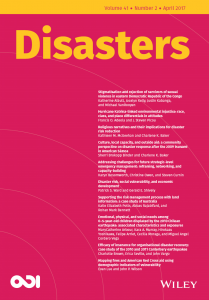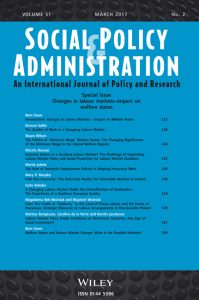Teaching Month: Forever a Student
When we here at Sociology Lens decided to dedicate July to posts about teaching, I had so much excitement. After all, graduate student advice month had gone over so well, why wouldn’t another themed month that is also relevant. I mean, is teaching not a significant part of what we do as sociologists? But there was one problem… I’ve never taught before. What could I offer in my posts?
Really. I had a very difficult time thinking of something, of anything, to offer. I’ve never even been a teaching assistant! Being in the classroom, beyond one or two guest lectures, is something that baffles me. On top of that, being so young (no more than 2 years older than some college seniors) and fresh out of college myself, how I could I really be considered an authority on being the teacher?
But then that is where it hit me. What makes a teacher? What is this state of being? While I’ve never been a teacher, per se, I’ve always been in a learning environment, both being taught and teaching others on the basis of my contributions and thoughts in class. While “teacher” may not be a formal title, we’re all teachers and we’re all students: we’re always learning something new from someone else, and we’re always taking that knowledge and sharing it through acts of teaching. A teacher is still a student. And after 20 years of formal education, being a student is something I do know a great deal about. It is in this role of “forever a student” that I know about what teaching was most impactful for me to learn.
So then, what does that have to do with teaching month? Upon this revelation that I do know something about the learning process, I wanted to share with you the most memorable and significant learning moments (those “ah-hah” moments, if you will) that I’ve had in my time as a student that really lead me to learn. I know we all deal with deadlines and procrastination and sometimes just memorizing something for a test is easier, but the goal of education (or arguably what should be the goal) is to really learn something, to question it, to apply it. In these three moments below, my teachers gave me the ability to really learn as a student, and one day when I am in their shoes, be able to use these same techniques that I share with you today.*
What would you like the exam question to say?
One of my all-time favorite professors (and eventually advisor and friend) would have two “exams” and two papers per semester. While normally that would bring someone like me, who hates the idea of an exam (because I overthink questions, am quite verbose, and hate time constraints), to a fetal position in anxiety, I looked forward to her exams and papers. That is because for every assignment (paper or exam, which was 2-3 shorter essay questions), she would ask the class “What would you like the exam question to say?” And she meant it. Together as a class we would review the material we had covered and together decide the 2-3 topics that the questions would cover. Her philosophy was that while there was a curriculum and certain points that we should learn as a class, there is sometimes the need for the class to explore certain venues and thoughts that were of value and interest further than in just class discussion. This way, the students themselves were able to pick out what topics, ideas, theories, and questions that not only interested them (because who wants to write a 7 page paper on something they don’t care anything about) but also challenged new ways of thinking. This definitely enriched my exam/paper writing experience, because I was able to really put effort and passion into what I was writing, not just looking for the “right” answer. Sure the questions were re-written so that they still offered a challenge, and we definitely still had to support our argument, but knowing what would be on the exam prior to the day, allowing for me to think about what I thought and what I valued and to put passion into my answer really allowed me to develop research passions. Who knows, maybe one of those exams could become a future publication?
Show me what you have learned.
My senior year of college, I took a course called “How do you know if students are learning?” or something along those lines. The class, held within the education department, was all about educational assessment and measuring how students learn, what types of learning, and different forms of assessment. The irony behind the class, though, was that our professor had to be able to assess how we were learning about how to measure learning (a little bit of inception for you). Our final project then, wasn’t a routine exam or paper, but rather our professor allowed us the opportunity to produce whatever we thought was necessary to show what we have learned (drawing on class notes, quizzes, our semester-long elementary school lab project, etc) and then orally defend it to him. This really made me question, what did I actually learn, not just temporarily memorize? How do I show this? How will I use this? I ended up putting together a portfolio of my class notes and showing graphs of my quiz grades (which could also show that I learned not necessarily information, but how to accel at his exams), but the most important key was a reflective statement that I included. Most of the students in the classroom wanted to be elementary school teachers, where I wanted to be a professor or work in college assessment offices. So that reflective statement was my opportunity to state that I honestly did not gain much from certain in-class topics about elementary school, but the overall ideas were applicable to my goals and I could show how. In this class, I was able to not only produce something that met the course objectives, but apply it to something that was relevant to me.
Forget a term paper, let’s learn to write a grant.
Finally, this past year, I had a wonderful learning experience in graduate school. Sometimes I feel like we get into a routine (due to the institutionalization of our professions) where we take a class, read certain books of the sociological canon, and then produce a term paper that then should become a manuscript or part of our dissertation. Everything we do accumulates to these two large components of our day-to-day tasks, so why not? In this class however, we were provided more hands-on, applied experiences of not writing a typical term paper, but to write a grant. Grant writing takes something extra, something different, from your typical term paper/manuscript, and while absolutely necessary to conduct our research, we rarely learn how to write a grant. This class in particular we wrote for the NSA Dissertation Grant, using topics in class, but in relation to our actual research so that hopefully we could use these edits (that were done amongst peers for more practice regarding peer-review, memos, etc) and actually use the grant. While I’m a few years away from the dissertation stage still, I now have more confidence in grant writing than most of my colleagues (I would feel safe to say), and I have every intention on applying for that grant. Why aren’t we taught more applicable skills that we are going to use?
All this is to say, the methods in which we learn help develop us, shape us, in our becoming of tomorrow’s teachers. These three moments are just some of the many influential experiences that have really shaped how I value thinking, teaching, and learning in the classroom. While I may not be a teacher yet, I do know what effective teaching looks like. I know what it feels like to really learn, to go “ah-hah,” to really enjoy and question and apply this newfound knowledge. I truly believe that effective learning comes from active engagement with and valuing the student.
*Granted, I did go to a liberal arts college with small classes, so some of these methods may not be completely feasible, say, for an Intro class of 500. More should be done about alternative styles of teaching and learning.
(I would be remiss if I did not mention that for other effective teaching methods, one should look within the literature for ideas, such as Teaching Sociology or related blogs, or submit your own pedagogical tools for others to learn from you!)





1754-9469/asset/society_affiliation_image.gif?v=1&s=9197a1a6ba8c381665ecbf311eae8aca348fe8aa)
